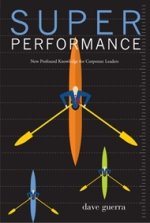ClubCorp Hosts Author Dave Guerra in a Nationwide Executive Briefing
Posted using ShareThis
Tuesday, April 13, 2010
Monday, November 16, 2009
Monday, June 22, 2009
Leadership and Management Complementarity of Superperformance
"[In 1961] I had occasion to discuss Bohr's ideas with the great Japanese physicist [Yukawa], whose conception of the meson with its complementary aspects of elementary particle and field of nuclear force is one of the most striking illustrations of the fruitfulness of the new way of looking at things that we owe to Neils Bohr. I asked Yukawa whether the Japanese physicists had the same difficulty as their Western colleagues in assimilating the idea of complementarity ... He answered `No, Bohr's argumentation has always appeared quite evident to us; ... you see, we in Japan have not been corrupted by Aristotle." -- Rosenfeld, Physics Today 16, (Oct 1963), pg. 47.
Labels:
complementarity,
management,
pxc,
Servant Leadership
Wednesday, May 27, 2009
So the new optimization . . .
is of course about harnessing the complementarity principle in your life and in the life of your organization, for maximum benefit and value. Niels Bohr, father of BOTH the atomic understanding and the particle-wave duality (complementarity principle) brought us this understanding of reality almost a century ago. A classically mechanical view of the universe ignores the fundamental requirement for a right brain, in part because there has never been a way to interact with it, with the complementarity principle in a practical way before, in organizations. It has not been seen before now, the complementarity of fully distributed management and leadership found in Superperforming organizations . . . . It has not been conventional wisdom that super-power can become unlocked in an organization from the inside out, leading to maximum wins and astonishing levels of responsibility an commitment.
But considering that the duality of process and culture is the particle and the wave of optimization is a powerful and shockingly simple super-paradigm to adopt.
The astonishing truth is that the mechanics of super are a quantum mechanics.
But considering that the duality of process and culture is the particle and the wave of optimization is a powerful and shockingly simple super-paradigm to adopt.
The astonishing truth is that the mechanics of super are a quantum mechanics.
Friday, September 12, 2008
The Emerging Culture Wars
Increasingly in the New Economy, the most important differentiator is proving to be corporate culture.
Research by Kotter and Heskett of Harvard Business School found that organizations with strong cultures had significantly higher performance than firms with rigid or weak cultures. The organizations with the strongest “adaptive” cultures saw their revenue grow four times faster, experienced job creation seven times faster, enjoyed stock prices that increased twelve times faster, and had 750% higher profit performance. Values guru Richard Barrett found that the return on assets and return on equity in companies with the best cultures was higher than the S&P 500 from 1991 through 1997. Malcolm Baldridge research on the comparative performance of winners against benchmark industry performance over a five-year period showed a statistically significant level of out-performance by as much as 34%.5 Denison Consultants found a similar relationship of outperformance in companies with strong cultures vs. companies with weak cultures over a 30 year period. And in our own research, the hypothetical "Superperformance Fund" outperformed the S&P 500 by a margin of five to one over a 20 year period, from 1985 to 2005.
Passion is always associated with Superperformance. This is the energy that not only produces great returns, but sustains them!
Organizations who want to be super must learn how to attract and energize hearts and minds.
People look for organizations who share their values, and organizations that align their values with those of their people are going to win the emerging culture wars.
Subscribe to:
Comments (Atom)



